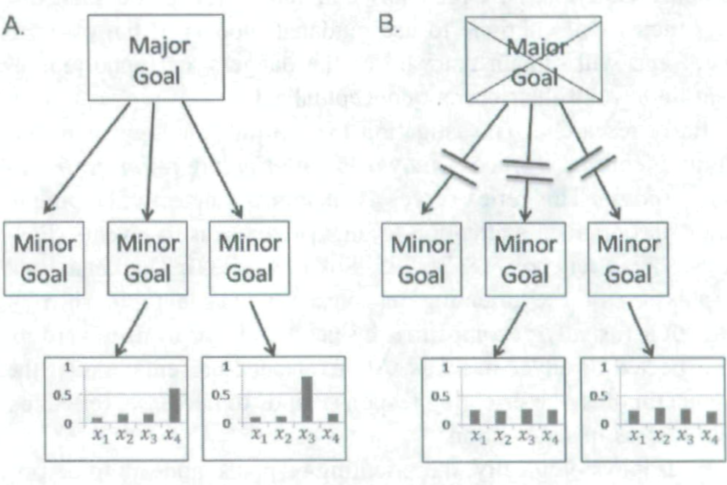Entropy, Relevance and Meaning, Part 1
What is psychological entropy and how to overcome uncertainty-related anxiety.
When moments become memories
There comes a time when goodbyes are in order. Friends, lovers, family - all will face the same treatment from you, and treat you the same in return. It is as inescapable as change itself, being tied with the passage of time. I've had to say a few goodbyes in my 26 years of age. Perhaps not as many as most of you reading this, but enough to have scars and understand the effects. The two main emotions experienced are alienation and loneliness; the first being associated to the outside world, while the second coming from contemplating your new place in it.
Let's take a simple scenario. You are studying abroad and the time has come to finally go home. You know what's coming. You can imagine what the last day will be like, when you close your apartment door for the last time and head to the airport. You picture your final days of that life. The coffee with friends, the last night out, the walk in the old city center. If you are an over-thinker, like me, you will make these thoughts at least a month prior to the event. All of these things are not memories yet. There is, however, a definitive moment when you are made conscious of the fact that the present is constantly being transformed into the past. All those insignificant everyday moments you took for granted and went through mechanically, are no more than memories anymore.
Maybe, that’s all they ever were.
More serious scenarios include ending a romantic relationship or the loss of a loved one. What follows is a dramatic shift in perspective. Familiar landscapes become foreign, indolence takes over, and thoughts run rampant.
My home has not been my home for some time now. My neighbourhood is not the one I grew up in. Driving back home has become a cold procedure as neither driving nor home have meaning anymore. I taste the bread and taste death. I look at the swirls of the water and greet time. I feel the sourness of the orange poison me with memories of a past that is not mine. The face in the mirror is hollow, the wrinkles on my skin a testament to my suffering, my hair is now grey. I have become my age.
- Unknown
This is a dangerous place to be when pain and loneliness are your only companions. The realization that time causes constant change and that change means universal impermanence, combined with the inability to detach from or integrate the past, is a major source of depression-related behaviour.
However, being sucked in a vortex of negative emotions isn’t as torturous as one might think. It gives off a perverse sense of enjoyment from the melancholy of reminiscing the past all the while sinking in the chaos of the present. This is precisely what makes this shift so dangerous. The temptation to willingly inhabit this state of semi-consciousness is rarely given any serious thought.
What can be done about this? Let’s take a look at the psychology of uncertainty.
Goals and narratives as ways to counter the increase in entropy
It is not hard to imagine the level of disorientation an individual feels when thrust into a new state. The alienation and loneliness are a direct product of an increase in uncertainty, a rise in entropy, and the demand for extra energy to move forward. A rise in anxiety also occurs. In a 2012 paper, Hirsh et al. (2012)1, introduced a framework that applies the idea of entropy to the human information system, the so-called EMU (Entropy Model of Uncertainty):
Four major tenets of EMU are proposed: (a) Uncertainty poses a critical adaptive challenge for any organism, so individuals are motivated to keep it at a manageable level; (b) uncertainty emerges as a function of the conflict between competing perceptual and behavioral affordances; (c) adopting clear goals and belief structures helps to constrain the experience of uncertainty by reducing the spread of competing affordances; and (d) uncertainty is experienced subjectively as anxiety and is associated with activity in the anterior cingulate cortex and with heightened noradrenaline release.
Entropy is the amount of disorder in a system associated with uncertainty. As time passes and new environmental conditions/challenges appear, entropy rises. The higher the entropy, the more energy needed for a system to keep the internal entropy in a manageable level. As far as biological organisms are concerned, they can be viewed as dissipative systems. Such systems actively attempt to reduce internal entropy by consuming energy from the outside of the system and displacing their entropy back into the environment, thereby resulting in more stable and organized internal states. It becomes obvious then how one can apply this framework for describing psychological phenomena.
A definition of psychological entropy can be formulated in the following manner (Hirsh et al., 2012):
Any given situation gives rise to a number of potential solutions and conflicting perceptions about the future. Similarly, in any moment, there is a probability distribution of possible outcomes. A flat probability distribution means no outcome is more probable than another, and such a state is characterized by high-entropy levels. Low-entropy levels are, on the other hand, associated with probability distributions that indicate some outcomes are more probable than others.
Therefore, when a biological system detects a flat probability distribution of potential outcomes, it immediately engages in problem-solving in order to reduce internal entropy. If this mechanism fails and entropy levels continue to rise, malfunctions due to lack adaptability are to be expected. In humans, these malfunctions are expressed as uncertainty-related anxiety, which continues to accumulate as entropy levels rise.
In particular, as an initially adopted strategy becomes ineffective, a quantifiable increase in the entropy of the problem-solving behavior is observed (measured as the irregularity and unpredictability of participants' responses). This increase in behavioral entropy precedes subsequent changes in solution strategy, followed by a return to predictable, stable, low-entropy behavioral patterns. What this suggests is that cognitive-behavioral systems follow the same basic principles as other dissipative systems. If the [self-organizing] system [i.e. human] finds itself unable to effectively handle environmental challenges, its internal entropy levels will increase and force the adoption or development of alternative cognitive structures. Alternatively, if such structures cannot be found, the system may fail to adapt, become overwhelmed, and start to deteriorate.
In other words, humans also follow the principles of self-organization and engage in problem-solving behaviour in order to effectively manage high-entropy states. New situations give rise to new challenges that we must overcome which in turn give room to more complexity that allows more challenges to appear. The way to overcome these challenges is by setting goals2.
Goal-setting is key to redefining the new perceptive landscape that emerges when uncertainty reaches very high levels, i.e. when most of the familiar elements in our environment disappear. Otherwise basic goals become essential to our mental health and simple everyday actions that push us towards a higher future goal have huge long-term effect. Anxiety is decreasing as we steadily move towards the newly set goals that accurately reflect our new situation as they have the capacity to transform the unknown into the known, chaos into order.
A goal can reduce uncertainty only as long as it allows for rapid functional categorization of sensory information as well as calculation of the (subjectively perceived) optimal response to any given situation. Poorly defined or vague goals are therefore less likely to provide effective uncertainty-reducing effects, as they are incapable of sufficiently narrowing the range of potentially relevant affordances.
Figure: (A) The adoption of a major goal is characterized by a series of minor goals by which a clear outcome is probable. (B) Failure to set an overarching major goal will result in a flat probability distribution of outcomes since no minor goal can predict what a specific outcome will look like.
Another mechanism that produces a similar outcome is the detailed account of a traumatic experience. The construction of a narrative, a life-story, diminishes the traumatic effects of past memories. Past experiences can be fully integrated into a coherent representation that functions as a guide for the future.
Producing detailed narratives about an ideal future yields psychological and physical health benefits similar to those obtained from narrating a personal trauma. Setting goals for the future, like telling stories, should similarly reduce the uncertainty associated with that future. Research confirms this idea, with the setting of concrete goals acting to reduce anxiety and increase performance (i.e., improving the ability to perform useful work). The integration of past experiences into a coherent, causal representation that includes desires and expectations for the future has similar benefits.
By viewing uncertainty as a fundamental threat to personal stability and integrity, EMU allows one to see how narrating a personal trauma, narrating one's ideal future, setting personal goals, and creating a coherent life story can all have very similar outcomes: All involve reductions in psychological entropy and the associated experience of anxiety.
Understanding the past allows for the collection of the proper tools in the present that will enable our ideal future to manifest.
Explanatory frameworks and the dangers of dogmatism
Goals and narratives are referred in the literature as explanatory frameworks. These frameworks, if adopted, can successfully reduce psychological entropy and clear the path for realizing future goals. If an individual experiences trauma caused by a past experience, their assumptions about the world become obscure and eventually dissolve. The result can be intense anxiety and PTSD, the latter caused by the inability to reconstruct a detailed narrative account of the traumatic experience (Hirsh et al., 2012). This procedure is essential in finally freeing the individual from the paralyzing effects of trauma and push them towards the adoption of clear goals. Small, incremental steps like this will gradually bring down entropy levels and reduce uncertainty about one's future and the world in general.
Additional frameworks would include religion and political ideology. Religion is known to imbue believers with spirituality and meaning, thereby fundamentally decreasing the uncertainty about the world. Similar effects are observed when adopting a political ideology. However, many psychologists warn of the danger that too much rigidity which often accompanies extreme ideologies and belief systems will have the opposite long-term effects. Despite the fact that in the immediate future the individual will experience a significant decrease in uncertainty, dogmatism ultimately leads to the crumbling of the ideas so strictly espoused. More specifically, it restricts the creative engagement in an ever-changing world and it suppresses exploration, instincts that are deeply ingrained in the human psyche.
Indeed, excessive rigidity and a reluctance to explore and confront uncertainty have been associated with a variety of pathological outcomes and the failure to adapt to changing circumstances.
Humans are destined to obey time. Any attempts to reject its passage are but illusions waiting to be shattered at any point with devastating effects. People don’t like to hear that, obviously. But why? Why are we so afraid of endings? How can we cope with such a reality? Extracting meaning from nihilism and harnessing negative emotion is no easy feat.
Facing the unknown is akin to traversing uncharted territory. It can be a deadly predicament as familiarity disappears to give its place to uncertainty. One must face the new world in a way that allows for purpose and meaning to be revived. A clear set of goals, a mission, preceded by the full integration of the past into the present is all the tools an individual needs to take on the world. Courage is not the absence of fear, but rather acting in spite of it.
If you enjoy my writings consider becoming a free or paid subscriber and join the community! You can also support me by buying me a coffee. Much appreciated!
This particular paper by Hirsh et al. (2012) is my main reference here. The work done on that paper is very important and many other aspects are discussed such as technical information on the EMU, the neurophysiology of uncertainty, goal conflict, combinatorial explosion, and the benefits of goal-setting, life-narratives, and religion. I highly recommend it to readers who are interested in a deeper dive on psychological entropy and uncertainty-related anxiety.
Habits that Changed my Life
In this brief intermission from the normal research-based articles, I am going to take the time and discuss the most important habits of my late adolescence and early adulthood; things that are normally considered cliche but when you discover the underlying structure they begin to make sense.






